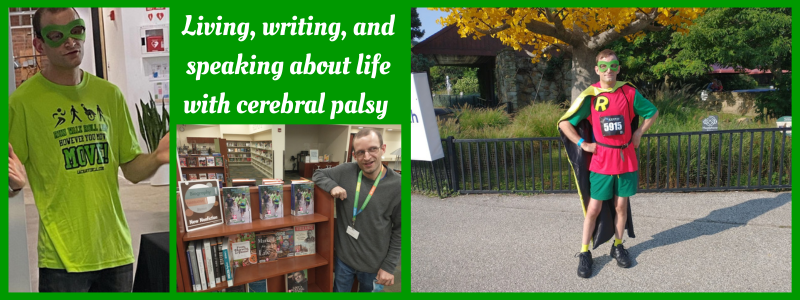A strong correlation seemingly exists between living with a disability and receiving offers for a helping hand. Although too frequently said “offer” comes across more forced than optional aid. Occurrences today’s post seeks to eliminate.
To those extending the aforementioned helping hand, please do not take the above comments offensively. My remarks intend to educate. However, I realize I may appear thankless. Dismissive even! Understand differently.
Heck, I am also guilty. Admittedly I am familiar playing the role ambitious helper. Considering my experiences encountering both sides to a helping hand, I can appreciate each perspective. Such appreciation provides a necessary element to produce useful conversation. Dialogue beneficial to everyone involved.
Invisible Lurker
Yet before anyone enjoys positive chatter, a shocking truth needs revealing. A third party lingers. An invisible lurker! Until exposed, this quiet but troublesome intruder will cause disconnect. So allow me to out the culprit. Sorry, preconceived notions. I am onto you!
Just reflect upon what triggers somebody to lend a helping hand. An attention grabbing situation unfolds. Preset belief convinces the scenario requires help. Therefore the aspiring do-gooder acts.
To give an example, I think back to my marathon training. I trained around my neighborhood. Multiple occasions surfaced where an acquaintance recognized me. “Hey Zach” I would hear. Followed by the outreaching helping hand, “Do you need a ride?”
Seeing me walking the person predetermined a narrative. “Zach must be going somewhere. I can help by offering a ride.” Quite different from the reality, my destination involving achieving a goal distance.

I am all smiles after a successful training outing.
Like stated earlier, I am at fault making similar assumptions. I volunteer, working alongside people with intellectual disabilities. Initially I thought “I want to help!” Exactly how I lacked any idea! I simply assumed they could use my assistance.
Over the years I learned to match my skills set among the various individuals I engaged. The way I am able to assist depends on the specific individual. My takeaway teaching you cannot provide a helping hand if generalizations occupy your mind. Generalizing served as my defective assumption.
Unintentional Slap to the Face
Still I possessed noble intentions, right? Same applies to friends who offered me a lift. Nonetheless had I accepted their aid the result damages, counterproductive to my original aim. The intended helping hand becomes an unintentional slap to the face.
Dependent the case, the consequences vary. Best option, the metaphorical whack leads to minor inconveniences. Worst chance though, serious injury occurs. No exaggeration!
Permit me to demonstrate. Aside my close pal James, I completed the Towpath Marathon Sunday, October 8th, 2017. During our near half day trek, I fell twice. A monkey ball caused the first incident. James reacted swiftly, looking to pick me up. Reaction I met via equally swift rejection.
“I’m trying to help” James defended his actions. Nevertheless I stayed unreceptive to his efforts. After a fall I enter a system check. My brain analyzes possible injuries. Say I hurt my ankle. Standing me forthright risks additional agitation.
Thankfully, I avoided significant wounds. A fact proved unknown in the moment. Ergo I resisted James. To maintain fairness, James knew nothing regarding the abovementioned. Segue to tidbit number three.
See Through
James held no method to know my body’s post-fall process. Under his perspective my response appeared disconcerting. He attempted to diffuse my apparent perplexing behavior using reason. James asking I perceive the scene outside my personal viewpoint.
Here I replied, explaining my hesitancy. I detailed my need to evaluate harm done prior to returning to my feet. Furthermore I disclosed falling’s ordinariness to me. When elementary school age I spent an entire summer in physical therapy learning to fall! Basically the big deal to onlookers registers routine to me.
Circa communicating the preceding to James, he understood. His exact comprehension tested proceeding my second fall. Oppose to reacting compulsively, James calmly asked “How can I help?”

James and I at the Towpath Marathon finish line.
Honestly, that teachable instance James and I shared stands a favorable memory. I came to respect the initial helping hand James sought to supply despite the misguidedness. He cares! I am fortunate to call him a good friend.
Meanwhile James realized the consequential trouble a well-intended helping hand potentially sets into motion. One mutual experience enabled James and I to learn separate valuable life lessons. Results only attainable because we expressed ourselves utilizing see through discussion. Transparent communication!
Offering a Helping Hand: What You Should Know
Overall the drama surrounding an extended helping hand probably resolves once you implement today’s lessons. To summarize, recognize an invisible lurker manifesting as preconceived notions may taint perceptions towards situations. These preset beliefs could make a well-intended helping hand an accidental slap to the face. All potentially avoidable if real transparent conversation takes place.
Do you agree? Perhaps you possess related insights I failed to mention. Go ahead and share by commenting below.



This is really well put. It tells you all you need to know.
Thanks Chris. I am glad you found the post informative.